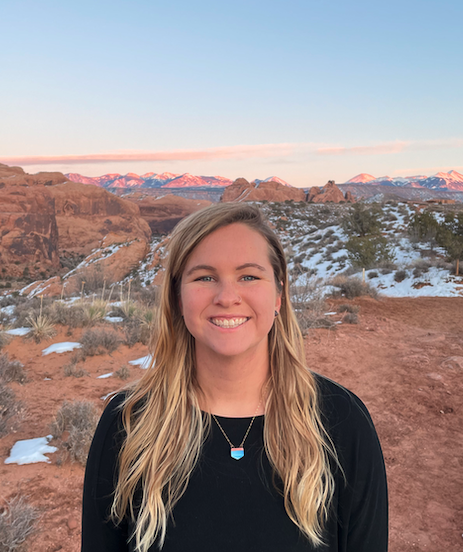Awards
The ESA Biogeosciences section proudly presents three awards annually:
1. Junior Scientist Outstanding Publication Awards
2. New Phytologist Innovation Grant for a Graduate Student Presentation
3. Student Travel Grants
1. Junior Scientist Outstanding Publication Awards
The ESA Biogeosciences Junior Scientist Outstanding Publication awards were initiated in 2007 to promote young scientists and highlight outstanding work in the field.
The Elizabeth Sulzman Award recognizes research conducted while a graduate student, and published within two years of graduation. The award is named for Elizabeth Sulzman, who was a professor of ecosystem science and biogeochemistry at OSU who worked at the HJ Andrews LTER on soil carbon cycling dynamics. She passed in 2007.
The Gene E. Likens Award recognizes work conducted by an early-career scientist (within five years of receiving a Ph.D.) for work conducted after the completion of graduate school. The award is named for Gene Likens, a limnologist and ecosystem ecologist. He co-founded the Hubbard Brook LTER and the Cary Institute of Ecosystem Studies, and he has pioneered watershed approaches to biogeoscience research.
The winner of each award receives a $250 cash prize and formal recognition by ESA. When appropriate, we also award an honorable mention prize within each category.
Meet the 2023 Winners!
 Michala Phillips won the Likens Award for her recent paper in Nature Climate Change.
Michala Phillips won the Likens Award for her recent paper in Nature Climate Change.
Phillips, M.L., McNellis, B.E., Howell, A. et al. Biocrusts mediate a new mechanism for land degradation under a changing climate. Nat. Clim. Chang. 12, 71–76 (2022). https://doi.org/10.1038/s41558-021-01249-6
Congratulations, Michala!

Nikhil Chari won the Sulzman Award for his recent paper in Nature Geoscience.
Chari, N.R., Taylor, B.N. Soil organic matter formation and loss are mediated by root exudates in a temperate forest. Nat. Geosci. 15, 1011–1016 (2022). https://doi.org/10.1038/s41561-022-01079-x
Congratulations, Nikhil!
Past Winners!
Gene E. Likens Award:
- 2022 Lee Dieterich
- 2021 Charlotte Alster
- 2020 Fiona Soper
- 2019 Colin Averill
- 2018 Debjani Sihi
- 2017 Steve Powers
- 2016 Peter M. Homyak
- 2014 Will Wieder (honorable mention: Jinyun T an)
- 2013 Park Williams
- 2012 Gordon Holtgrieve
- 2011 Ed Hall
- 2009 Stephen Porder (honorable mention: William Cornwell)
- 2008 Jennifer Funk (honorable mention: Kristina Anderson-Teixeira)
- 2007 Ben Houlton, Katey Walter
Elizabeth Sulzman Award:
- 2022 Melinda Martinez
- 2021 Brittni Bertolet
- 2020 Mingzhen Lu (honorable mention: Anika Staccone)
- 2019 Andrea Jilling
- 2018 Justin Mathias
- 2017 Erin Hanan
- 2016 Yaling Liu
- 2015 Colin Averill
- 2014 Sarah Batterman (honorable mention: Janice Brahney)
- 2013 Lei Cheng
- 2012 Scott Morford (honorable mention: Arianne Cease)
- 2011 John Drake
- 2010 Philip Taylor
- 2009 Michael Strickland (honorable mention: Jia Hu)
- 2008 Duncan Menge (honorable mention: Ben Colman)
- 2007 Scott Ensign
2. New Phytologist Innovation Grant Award for a Graduate Student Presentation
The New Phytologist Innovation Grant Award for a Graduate Student Presentation recognizes an outstanding student oral presentation at the ESA Annual Meeting, for research conducted while a graduate student. The ESA Biogeosciences Section awards a $500 cash prize generously sponsored by New Phytologist.
Meet the 2023 Winner!

Sean Khan Ooi is the winner of the 2022 New Phytologist Presentation Award from the ESA Biogeosciences Section for his talk “Denitrification phenotypes: A framework for linking soil moisture regime to nitrous oxide emissions”.
Congratulations, Sean!
Past winners:
- 2022 Jon Gewirtzman
- 2021 Emily Stuchiner
- 2020 Jessie Motes
- 2019 Steven McBride
- 2018 Jamie Harrison
- 2017 Brooke Osborne
- 2016 Matthew Craig
- 2015 Cari Ficken Hopping
- 2014 Kelly Hopping
- 2013 Jessica Corman
- 2012 Bonnie Waring
- 2011 Sarah Evans
- 2010 Edward Brzostek
- 2009 Amy Burgin (honorable mention: Carmody “Carrie” McCalley)
3. Student Travel Awards
Biogeosciences section sponsors multiple travel grants to our student members for attending the ESA Annual Meeting. All student members of our section, who are affiliated with an accredited university, are eligible to apply.
Meet our 2023 winners!
-
Meaghan Petix
-
Jacob Weverka
Past winners:
- 2022: Amanda Cordeiro, Evan Perkowski, Megan Wilcots, Wenguang Tang, Jennifer Holguin
- 2021: Joseph Edwards, Steve Gougherty, Eduard Navarro-Perez, Aral Greene, Christa Torrens, Zhe Ren, Tyler Anthony, Meaghan Petix, Dawson Fairbanks
- 2020: Courtney Currier, Malissa Ann Tayo, Matthew Smith, Elizabeth Forbes, Justin Gay, Abigail Lewis, Sommer Starrm, Chelsea Duball
- 2019: Steven McBride, Michelle Wong, Tempest McCabe
- 2018: Anecia Gentles, Lilli Kaarakka, Covel McDermot, Cody Reed, Sasha Vivelo
- 2017: Daniel Casarella, Jennifer Cristiano, Rebecca Evans, Russel Hedberg, Rachel King. Brittney Monus
- 2016: Elizabeth August-Schmidt, Joseph Carrara, Amber Churchill, Denise Devotta, Benton Taylor, Lorna Harris
(2020 and 2021 awards were registration grants for the virtual meeting due to COVID).
Award nominations are now open for 2024!
Junior Scientist Outstanding Publication Awards
Each year, the awards are presented to the first author of a notable paper in the biogeosciences that was published between January of the previous year and March of the current year. To be considered for an award, the paper must have been assigned a DOI. The Elizabeth Sulzman Award recognizes research conducted while a graduate student, and published within two years of graduation. The Gene E. Likens Award recognizes work conducted by an early-career scientist (within five years of receiving a Ph.D.) for work conducted after the completion of graduate school.
Nominees should be members of ESA, and should be or become members of the Biogeosciences Section.
For 2024 Awards: Nominations for each award should include the following, emailed to esabiogeoscience@gmail.com by July 1, 2024 [note extended deadline] with the subject line “Sulzman Award nomination_[nominee’s last name]” or “Likens Award nomination_[nominee’s last name]”, and the following information:
- The paper’s citation and a PDF, or the title of the paper/talk to be presented.
- The first author’s current contact information (name, email address, mailing address optional)
- A statement of eligibility (e.g. current grad student/graduation date, or postdoc <5 years fromPh.D.)
- A short letter in support of the nomination from a colleague or advisor (sent separately from above materials unless the recommender is also the nominator
We note that while self-nominations are entirely appropriate, the potential awardee need not be involved in the nomination process. We encourage all section members to nominate outstanding papers that they have encountered.
A panel of reviewers representing a broad array of disciplines within the biogeosciences will then evaluate the submissions and decide on the winning entries. Award winners will be notified in advance of the upcoming ESA Annual Meeting, and the section will make a public announcement. Winners of each prize are encouraged to attend the ESA Annual Meeting!
New Phytologist Innovation Grant Award for a Graduate Student Presentation
The New Phytologist Innovation Presentation Grant recognizes an outstanding student presentation at the ESA Annual Meeting. The winner of the oral presentation award will win a $500 cash prize and formal recognition from ESA and the New Phytologist. Poster presentations cannot be considered for this award.
Students are welcome to nominate themselves if they are giving an accepted Oral Presentation at the next ESA meeting. An advisor must also email a letter of support. We note that while self-nominations are entirely appropriate, the potential awardee need not be involved in the nomination process. We encourage all section members to nominate outstanding papers that they have encountered
Nominations must list: (1) the title of the accepted abstract, (2) the session and time of the talk, and the following information about the presenting student: (3) degree sought, (4) years to completion of degree, and (5) whether they have advanced to candidacy.
For 2024 awards: Nominations for the award should be emailed to esabiogeoscience@gmail.com by July 28, 2024 [note extended deadline] with the subject line “New Phytologist Presentation_[nominee’s last name]”.
Student Travel Awards
The ESA Biogeosciences section will give our 3-4 travel awards of up to $500 to graduate students to attend the in-person annual meeting. Awards are given based on both merit, progress toward degree, and need. Email applications to: esabiogeoscience@gmail.com.
Important Dates
-
April 15, 2024: Application window opens.
-
May 20, 2024: Application window closes.
-
June 17, 2024: Notifications.
-
Aug 4–9, 2024: ESA Annual meeting in Long Beach, CA.
Important Considerations
- Applicants who have received an award in the past year are not eligible to apply.
- Priority will be given to PhD students in the late stages of their degree.
- Applications exceeding the word/page limit will not be considered.
Requirements
Email you application package to esabiogeoscience@gmail.com, and a letter of support from the applicant’s supervisor explaining why they need the financial aid and any merit considerations (can be sent as a separate email directly from supervisor).
Applicants must prepare one PDF document containing the following sections:
- Motivation statement (250 words max): How would this funding and attending the ESA meeting will advance your career? What is your main research discipline? Why is your research relevant to the Biogeosciences?
- Diversity statement (150 words max): Describe any past or current initiatives that have helped promote diversity in the Biogeosciences, and describe how you envision your future work to contribute to increasing diversity.
- Resume (half a page max). List your career stage (progress towards completion of degree), disciplinary background/education, and relevant publications or prior presentations.
Applications will be evaluated on a 10-point scale based on:
1. Scientific motivation, relevance of research interests/goals (4 pts).
2. Disciplinary background, and career stage (3 pts).
3. Diversity statement (3 pts).
Download instructions as a PDF here: 2024 ESA Biogeosciences Student Travel Awards_Instructions.